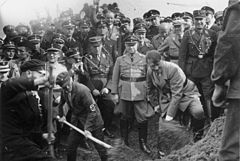Economy of Nazi Germany
| Economy of Nazi Germany | |
|---|---|

Hitler at a ground breaking ceremony for the completed Reichsautobahn highway section
|
|

Prisoner work–force in the construction of the Valentin submarine pens for U-boats, 1944
|
|
| Location | The Third Reich and German-occupied Europe; forced labour predominantly from Nazi occupied Poland and the Soviet Union |
| Period | Great Depression and World War II (1933–1945) |
The German economy, like those of many other western nations, suffered the effects of the Great Depression with unemployment soaring around the Wall Street Crash of 1929. When Hitler became Chancellor in 1933, he introduced policies aimed at improving the economy. The changes included privatization of state industries, autarky, and tariffs on imports. Wages increased by 10.9% in real terms during this period. However, reduced foreign trade meant rationing in consumer goods like poultry, fruit, and clothing for many Germans.
In 1934 Hjalmar Schacht, the Reich Minister of Economics, introduced the Mefo bills, allowing Germany to rearm without spending Reichsmarks but instead paying industry with Mefo bills (Government IOU's) which they could trade with each other. Between 1933 and 1939 the total revenue amounted to 62 billion marks, whereas expenditure (at times comprising up to 60% rearmament costs) exceeded 101 billion, thus causing a huge deficit and national debt (reaching 38 billion marks in 1939 and coinciding with Kristallnacht [November 1938] and with intensified persecutions of Jews and the outbreak of World War II.) When a large share of Mefo’s five-year promissory notes fell due in 1938, the National Socialist government employed “highly dubious methods” where “banks were forced to buy government bonds, and the government took money from savings accounts and insurance companies,” due mainly to a serious government cash shortage. By 1938 unemployment was practically extinct.
Early in his political career, Adolf Hitler regarded economic issues as relatively unimportant. In 1922, Hitler stated that "world history teaches us that no person has become great through its economy but that a person can very well perish thereby", and later concluded that "the economy is something of secondary importance". Hitler and the National Socialists held a very strong idealist conception of history, which held that human events are guided by small numbers of exceptional individuals following a higher ideal. They believed that all economic concerns, being purely material, were unworthy of their consideration. Hitler went as far as to blame all previous German governments since Bismarck of having "subjugated the nation to materialism" by relying more on peaceful economic development than on expansion through war.
...
Wikipedia
